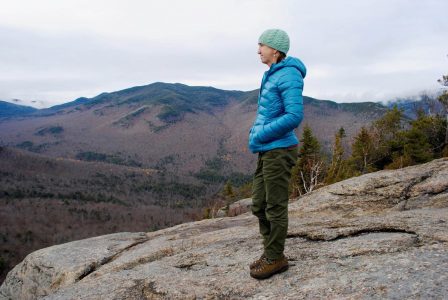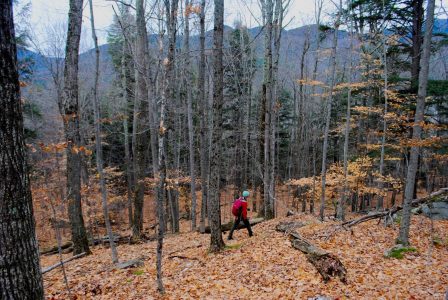Wild Side: How a trans forest ranger found herself in the Adirondacks
- Robbi Mecus is a New York state forest Ranger working in the Adirondacks. (Provided photo — North Country Public Radio — Emily Russell)
- Robbi on the summit of Rooster Comb. (Provided photo — North Country Public Radio — Emily Russell)
- Robbi hiking down from Rooster Comb. (Provided photo — North Country Public Radio — Emily Russell)

Robbi Mecus is a New York state forest Ranger working in the Adirondacks. (Provided photo — North Country Public Radio — Emily Russell)
A lot of people come to the Adirondacks to find themselves. Robbi Mecus made a career here as an Adirondack forest ranger and chased her passion as a rock and ice climber. Mecus also came out as a transgender woman and has become a role model for people who aren’t always seen and accepted by the outdoor community.
I meet Robbi Mecus outside her house in Keene Valley, in the Adirondack High Peaks. She’s got her hair in braids and is wearing little teal earrings that match her puffy coat. We lace up our boots and head out for a hike up Rooster Comb.
“This is a favorite trail because it’s something right close to home,” Robbi says. “I can walk to it from my house and it has this amazing view.”
The trail takes us deep into the woods. Robbi has lived here for years but says these mountains still amaze her. “They’re rugged and they’re wild and they have a sense of awe,” says Robbi.
We reach the summit, a gray shelf of rock. From here we see the sharp outline of some of the park’s highest peaks. How Robbi found this place, how she found herself here, goes back decades.

Robbi on the summit of Rooster Comb. (Provided photo — North Country Public Radio — Emily Russell)
–
Dreaming of wild places and a different life
–
“Even as a very small kid, I was very attracted to the notion of wildness, wild places,” says Robbi. “I would cut pictures of mountains out of magazines and hang them on my wall.”
Robbi was raised in Brooklyn. Wild places like the Adirondacks seemed unreal back then. She says her family was Catholic, conservative, blue-collar.

Robbi hiking down from Rooster Comb. (Provided photo — North Country Public Radio — Emily Russell)
“We didn’t have a lot of money, we didn’t really integrate with a lot of different people. It was very insular.” It was the 1980s. Even as a little kid Robbi knew she was different.
“From the moment I had an idea of what gender was, I knew that I was a girl. But I also knew pretty early on that girls didn’t have the body that I had.”
Robbi was born in a boy’s body. Growing into that body Robbi says was scary and confusing. As a kid, she tried to be herself, tried dressing like herself.
“I would insist on wearing girls’ clothes to school. I remember having fights with my mother, her putting me in button shirts and buster-brown shoes and cutting my hair, and just screaming at the top of my lungs until I lost my voice.”
–
A Song On The Radio
–
Robbi says back then she didn’t know anyone who was openly queer or trans. She didn’t have anyone to talk to about this stuff. Then Robbi heard something on the radio, a kind of opening.
“Do you remember the Lou Reed song?” Robbi asks. “Walk on the Wild Side.”
“The first character in that song was Holly. ‘Holly came from Miami, FLA, she hitch-hiked her way across the USA.’ I wanted to be Holly. I wanted to be that girl who just owned her identity and took her life in her own hands and went off and lived it. And that was what I thought I was going to do.”
Her plan after high school was to pack up and leave home. Live as an openly trans woman. “But I was scared,” says Robbi. “I was scared and afraid and I didn’t know how I was going to live my life.”
–
Equal at the cliff
–
Robbi says she couldn’t see a safe way forward. So she stayed in the body she was born in for years. The next opening, came one day when she was looking through a newspaper. She saw an ad for a climbing gym. From the first time she roped up, Robbi knew this was the community for her.
“It was the first thing that just brought all sorts of different people together. Rich people, poor people, men, women, people who looked different than I did, had different colored skin than me. Everybody was equal at the cliff.”
Robbi spent more and more time with climbers. She took classes and traveled to places that used to be just pictures on the wall. That’s how she found the Adirondacks. “We took a trip up to the High Peaks here and instantly fell in love,” says Robbi.
Things were starting to click. She found a place that felt like home and, on that first trip to the Park, Robbi talked with a forest ranger. “I knew right from that day that this is where I wanted to be and this is what I wanted to do with my life,” says Robbi.
–
A Life In The Mountains
–
So, she went for it. In 1999, Robbi Mecus became a New York State Forest Ranger. She was in her thirties, working her dream job – and she says she thought maybe that was enough – maybe she could make her life work be happy in a man’s body. She even got married, had a daughter.
“If I settle down and I get married and I have a kid that’s going to cement that I’m not trans. Maybe I’m just gender-curious. Maybe I just need to express myself once in a while.”
By ‘express herself,’ Robbi means cross-dress. Robbi would go down to the city every once in a while, dress like a woman for a day or two, and come home. But Robbi says that made things more complicated, scary even.
“Every time I did it, it became harder and harder to come back. It became harder and harder to go back to being who I knew I wasn’t. I’ve been pretty fortunate in my life- I’ve never suffered from depression. I never had suicidal ideations, but that was the first time in my life where I thought, ‘I can’t continue doing this. I’m going to wind up dead.'”
So three years ago, when Robbi was 44 years old she decided it was finally time. She remembers the night she told her wife she planned to transition.
“I just kind of walked into the house and broke down and told her everything. That was a hard day.”
–
Coming Out
–
Robbi also had to come out to the people she worked with. A lot of the Adirondacks are like the bubble she grew up in– conservative, blue-collar, not a big community of openly trans or queer people. Robbi thought maybe this other thing she loved, her career as a forest ranger, was over.
“My job relies on those personal connections with other rangers and personal connections with fire chiefs and local police chiefs and all that stuff and I was pretty convinced that that wasn’t going to be there and that I wasn’t going to be able to do my job. So I had to accept the fact that I wasn’t going to be a ranger.”
But then this surprising thing happened. People who knew her, like her coworkers– they supported and respected her. Robbi says she felt this wave of relief. It was all coming together. She was in the right body, the right job, but Robbi says there was one more thing she had to do.
“I had to accept myself more than forcing other people to accept me. I had to accept that I can be strong. I can be dirty. I can be feminine. I can be all those things.”
“I can create my own version of what femininity looks like.”
A video of a winter rescue in 2018 gives a glimpse of what that looks like. Robbi is hauling herself up a frozen mountain above the treeline carrying this huge pack. The wind so fierce it nearly knocks her over. As an openly trans woman, Robbi patrols these mountains and saves lives.
–
A forest ranger and a role model
–
Robbi also talks more publicly about her work. She does Facebook live events where she answers questions about climbing and camping in the park. She’s also written for a major climbing magazine, performed at live storytelling events.
It’s scary putting herself out there, Robbi says, but it’s important that women like her be seen.
“There are many reasons I didn’t come out until I was 44, but one of them was because I didn’t see anybody else doing the things that I still wanted to do and I didn’t think I could do them.
I didn’t see any queer rangers,” Robbi says, “I didn’t see any trans climbers.”
Robbi hopes her story will make it just a little easier for other people who feel different and afraid to come out as trans or queer. But she also says one part of accepting herself is accepting how long it took her to get here.
“I often think about what would have happened with my life, had I become Holly where my life would have gone,” Robbi says.
“The sad reality is that people who did that, who had to [transition] back in the ’80s, early ’90s, they had a hard life. So, in some ways, I’m sad that I didn’t transition way back then. I’m very sad that I lost those 20 or 30 years of living an honest life, but in other ways, I’m content with how my life turned out.”
Letting Holly go meant, after a lot of work and some really hard years, Robbi could be a mom, a forest ranger, a climber, and a role model. She’s part of this bigger change where trans and queer people can be anything.









